- Home
- William Shatner
Up Till Now Page 6
Up Till Now Read online
Page 6
More people were watching me walk across that set than had seen Julius Caesar in his entire lifetime. More people were watching me walk than the entire population of most of the countries in the world. And I became conscious of the way I was walking. Was I walking too fast? Were my strides too long? Did it look natural, was I walking like I really walked? Was I acting like I was walking or walking like I was acting? I felt my legs begin to tighten up. I couldn’t believe it, I was getting stage fright. Walking may well be the most natural of all movements—and I couldn’t remember how to walk naturally. It probably took me eight steps to get across the set, the longest eight steps of my entire life.
Many years later I was narrating a documentary series entitled Voice of the Planet, for which I traveled around the world. For one amazing shot a helicopter dropped me off on top of a twenty-thousand-foot-high glacier and left me there alone. “Don’t move,” the producer warned me. “There could be a fault line here somewhere covered by snow. You might step into a crevasse and no one would ever know it.”
“Don’t worry,” I assured him. “I’m not going to move.” Move? I wasn’t so confident about breathing too deeply. The concept was that the chopper would rise slowly to the top of the glacier and suddenly see one man standing there, the only living thing in this vast sea of snow. It was a great idea—until the helicopter took off and left me there more alone than I had ever been in my life. That feeling of loneliness was absolutely incomprehensible. I kept reminding myself that soon the helicopter would be coming back to get me off and I’ll be with my friends and we’ll go down to the village and eat and drink and laugh and talk about what a great shot we did. But then I looked down and realized the helicopter’s landing pads had left two deep impressions in the snow, which would spoil the shot. I’ve got to move just a few feet, I decided.
I moved several inches at a time, small, tentative steps, testing the snow before I put my weight down. It took me at least ten minutes to move about twenty feet.
And that’s exactly how I felt walking across the set on Studio One. It was an extraordinary time, we were creating television on a weekly basis. The only rule was that there were no rules, you could do anything you could get away with. Most of the TV studios were converted live theaters, and we also did a lot of filming on city streets. It was all very seat-of-the-pants. We didn’t have trailers, we changed our costumes in restaurant bathrooms or even telephone booths. We froze in the winter and sweated in the summer. We dealt with whatever problems occurred. For example, I was shooting a Studio One on a midtown street and the script required me to bump into someone, which led to a fight in which the other actor fell and hit his head and was killed. There were no such things as permits and shutting down streets; you got a camera and went outside and you shot the scene using available light. It was important to film only the backs of pedestrians so the producers didn’t have to ask them to sign a release, so most of the time we had to walk against the flow. So I bumped into the other actor and started the fight and suddenly I felt people grabbing me and trying to break it up. What could I tell them, we’re not actually fighting but please let me kill him?
On a weekly basis I was working with legendary movie figures like Alfred Hitchcock, Lee J. Cobb, Raymond Massey, Ralph Bellamy, and even Billy Barty, as well as talented young actors just beginning their careers, such as Lee Marvin and Jack Klugman, Paul Newman, and Steve McQueen. I worked with Steve McQueen in a classic legal drama titled “The Defenders” on Studio One. Ralph Bellamy and I played father-and-son lawyers defending McQueen on murder charges. At the conclusion I used a courtroom trick, fooling the only eyewitness by planting a McQueen look-alike in the spectator section, to get him off—at the cost of my father’s respect. I remember watching McQueen work and thinking, wow, he doesn’t do anything. He was inarticulate, he mumbled, and only later did I understand how beautifully he did nothing. It was so internalized that the camera picked it up as would a pair of inquisitive eyes. Out of seemingly nothing he was creating a unique form of reality.
The show was so well received that CBS decided to develop it as a series, offering the leading roles to Bellamy and myself. We both turned it down. I was too smart to get caught in that trap. Serious actors didn’t do a TV series. Instead E. G. Marshall and Robert Reed starred in the show, which has been recognized as one of the great courtroom dramas in TV history. Among the young actors who worked on the show were Robert Redford, Dustin Hoffman, Gene Hackman, James Earl Jones, Martin Sheen, and Ossie Davis.
I also turned down several commercials for the same reason: serious actors did not do commercials. I couldn’t imagine the audience accepting an actor in a dramatic role after they’d seen him selling cigarettes or laundry detergent. A serious actor has to draw the line. I was adamant, I would not sell laundry detergent!
I had become one of the leading men of television. There were few roles that I wanted and didn’t get. It was magical. I learned to love doing live television. There was an indescribable excitement and energy that came from knowing you had only one opportunity to get it perfect. No cover shots, no second chances. The cameras we used were very large and contained a lot of very hot tubes, and so they also had small fans in them. The fan made a low wooooooooooooossssssssssssssssshhhhhhhhhhhhhhing sound as it cooled the innards of the camera. If you listened closely, it almost sounded like they were purring. Behind the camera was the cameraman, but often he was mostly hidden by it, so it looked like it was moving on its own. One time I saw two cameras on electrical dollies get loose. They came toward each other, hit, and fell over, like massive prehistoric animals.
And when the red light came on it was as if they were alive. Watching you, moving after you. If I had to make an entrance in the middle of a scene I would stand right next to the camera, feeling its warmth, hearing it purr. I loved that camera, you could pet it, savor it, but it never frightened me.
I was getting the kind of notices every actor dreams about. On Studio One, Variety raved: “Both Lee J. Cobb and William Shatner were magnificent.” After I played a bigot and the leader of a lynch mob on Playhouse 90, the New York Times wrote: “...the embodiment of hate and blind physical passion, Mr. Shatner’s attention to detail in putting together the picture of ignorant and evil social forces was remarkable...Two of the season’s superlative performances by Rod Steiger and William Shatner.” Variety described my performance on The U.S. Steel Hour as “moving... [Shatner] is unforgettable as the young priest.”
The only problem I was having in my life was with Gloria. I was becoming a star; she was remaining my wife. And for an actor, the role of a star’s wife is not a very pleasant one to play. She was working, but not as often as I was and in smaller parts. But finally she was invited to audition for a role for which she was absolutely perfect. It was as if it had been written specifically for her. This was going to be the role that established her—and she didn’t get it. It was devastating, the worst possible thing that could happen to a person with such a fragile personality. It was the ugliest side of an actor’s life: from the euphoria of the possible to the despair of reality. It was very difficult for me to enjoy my career when every success I had was a painful reminder of her lack of success. This beautiful girl who had a great deal of talent just wasn’t getting the opportunity to work. She was terribly frustrated. Every success I had seemed to magnify her lack of success. There was always this underlying feeling that I’d better not talk too much about what happened in rehearsal that day or mention I was offered this part. So I acted all day and then went back to Queens and played another role.
As it turned out movie producer Pandro S. Berman was producing an epic version of Dostoyevsky’s The Brothers Karamazov, and had already signed Yul Brynner, Lee J. Cobb, and Claire Bloom. The director was Richard Brooks, who was well known for films like Blackboard Jungle, The Catered Affair, and Something of Value. Berman happened to see me in “The Defenders” on Studio One, and was impressed with my work and my cheekbones, which apparently resemb
led Brynner’s. The cheekbones, I mean. I was asked to do a screen test, an audition really, and in preparation I read the novel. I know it’s an extraordinary piece of literature but . . .
Oh, this is good news. The Biography Channel just called to tell me they’ve decided to produce an interview show I’ve created entitled Shatner’s Raw Nerve. Basically, I’m going to interview actors and politicians and ask them about subjects they generally don’t discuss. That’s great. In the same press release the Biography Channel also announced another new show, Small Medium at Large, about “a four-foot-tall psychic medium who uses Chinese meditation to commune with the dead.” That’s great, maybe I’ll do a short interview with him. I can just imagine the response from some people when they read this release: “Shatner has an interview show?”
. . . so, I read The Brothers Karamazov and I couldn’t make sense of it. It’s very difficult reading. It’s the classic story of a nineteenth-century Russian family ripped apart by money, passion, some patricide, love, and snow. A lot of snow. Eventually I was offered the role of Alexei, the youngest of the four Karamazov brothers. Yul Brynner was my oldest brother, Dmitri, who was scheming to get our father’s fortune. Lee J. Cobb was our lecherous father, whose character was described in his line, “Each man should die on his own chosen field of battle—mine is bed.”
This was my big break, this role was going to make me a star! While it wasn’t going to make me rich, it would make me financially secure for the first time in my career. Even working as often as I did, I still had not managed to save more than eighteen hundred bucks. That was my goal, to have more than eighteen hundred dollars in the bank, and this role would enable me to do that.
Gloria and I had bought a little sports car, a convertible. We packed all our belongings, put down the top, and drove across America. When we got closer to Los Angeles I put up the top and in that sudden quiet I realized I hadn’t spoken with my wife in four days. That trip put a distance between us that I’m not sure we ever really closed.
We rented an apartment in a complex in Westwood that was popular with people in the entertainment industry. Among them was a beautiful young woman who would sit around the pool all day wearing large sunglasses, always by herself and never talking to anyone. She was so wonderfully mysterious. What was the secret behind this beautiful young woman who never left the building and refused to speak to anyone? Only later did I find out she had been stashed there by Howard Hughes, who never showed up. That was her job, waiting for a man who was never going to arrive. But seeing her there, day after day, fit so perfectly with my image of Hollywood.
This was my initiation to the movie business: as I drove to the M-G-M lot on the morning we were to begin work I thought about my father’s plea that I not become a hanger-on. Five years he’d given me, and here I was literally on my way to becoming a movie star. It was an extraordinary feeling. I pulled up to the front gate and the guard asked for my pass. His name was Ken Hollywood, and I will never forget it. I didn’t have a pass. I was in a major motion picture, I explained, I didn’t need a pass. He looked at his clipboard and shook his head, “You’re not on the list,” he said.
“I’m William Shatner,” I said, and for the dramatic purposes of this book I’ll assume beads of sweat began forming on my forehead. “You see, I’ve got to be on the set at nine o’clock...”
“You’re not on the list,” he repeated firmly, directing me to make a U-turn and leave M-G-M. I drove all the way back to Westwood and sat in my apartment all morning until the confusion was cleared up. Apparently someone had forgotten to put me on the list. Perhaps that should have given me some idea of my importance in this production.
The Brothers Karamazov was my first experience on a big-budget film. Most of the television shows I’d done had taken less than a week to complete and the budgets were so small we had to wear our own clothes; the shooting schedule for this movie was several months. From the very beginning what surprised me was the ease with which vast sums of money were spent on things other than the actual production. Lunch cost more than an entire Playhouse 90 production. The meals, the cars, the perks, the amount of money that was spent on everything but the movie was astonishing. And nobody seemed to even notice.
The process of making this movie had absolutely no relation to any acting experience in my career. It seemed to me that most of the other actors would learn their lines on the set. I was working as I had learned to work: I knew the entire script before I got to Hollywood. To me, that’s the work of acting. Acting is memorizing, absorbing the words and knowing what they mean to the character and how you want to say them. Once you’ve done that, it’s sandbox time. Playtime. What we’re doing is pretending, so let’s go ahead and pretend with the tools we have, the shovel and the pail, or in the actor’s case your lines and your knowledge of the character. But several actors literally would be learning their lines as we were shooting.
Director Richard Brooks was a bit of a perfectionist. I was actually witness to nineteen takes for the word no. It wasn’t me, it was someone else, and it took nineteen takes to get it exactly the way he wanted it. Until that day, I didn’t know there were nineteen different ways to say no. Is that how you want me to say it? No. No? No. You mean no? Yes.
After the first dozen attempts all the pretend has disappeared. By the time you say any word fifteen times you no longer even understand the meaning of the word. It’s just a sound. Do you understand the meaning of the word no? No. Yeah, that’s good.
I played a minor role in the film; mostly my job was to stand in the background looking saintly. The problem with being saintly is that Yul Brynner kept kicking me in the pants. Being new to the movie business I didn’t know exactly what that meant. That’s the entertainment industry, when someone kicks you in the pants it’s not just someone kicking you in the pants. It requires analysis: it might be a show of affection. I like you, therefore I can kick you in the pants to show it; or it might just as easily be a display of anger. I don’t like you at all, so I’m going to kick you in your pants. Or it might even be a demonstration of power. I’m so important that I can kick another actor in the pants and no one will stop me. Or it might even simply be intended as a joke. We’re all so serious and self-important here and what could be sillier than kicking someone in the pants?
I didn’t know what to do. I remember knowing how demeaning it was but not how to respond. He was the star of the movie and I wanted to be successful and I believed he could make or break me. So I didn’t know whether to say, “Mr. Brynner, would you mind not kicking me in the pants?” Or ask him, “Would you like to kick me in the pants again?” I was torn between those two responses and a third, which is really what I wanted to do. I wanted to punch him out.
Well, he was in pretty good shape too. So for the rest of the film I did my best to keep my pants out of the way of his foot. And I learned a very important lesson that I have followed throughout my career: don’t kick other actors in the pants.
Later in life, when Yul Brynner had cancer and was making his final tour in The King and I, I went to see him. He was very affectionate in his emotional memory. He remembered a wonderful shoot. All I remember is getting kicked in the pants. The film received very nice notices. Variety wrote: “Shatner has the difficult task of portraying youthful male goodness, and he does it with such gentle candor it is effective.” In other words, I was very good at portraying being very good.
At the same time I was learning how to be married. Supposedly it was Sir Donald Wolfit who said on his deathbed, “Dying is easy, comedy is hard.” Well, compared to being married, comedy was easy. I had no experience in the great art of living with another person. The great surprise of marriage is that the other person is always there, and has needs and desires that are often in conflict with your own—and sometimes, may actually be right. Everything I knew about marriage came from my mother and my father, and they never raised their voices to each other. Gloria knew how to have an argument; I didn’t. Instead o
f raising my voice and flailing my arms I remember feeling that her actions were unjustified. I didn’t understand how someone could love you and still yell at you. So from time to time I was set right back on my heels.
What I didn’t know how to do was put myself in somebody else’s shoes. Or more specifically, someone else’s high heels. I always thought of myself as being sympathetic and loving and kind. But I didn’t think of myself as wrong. It has taken me four marriages to understand the part I have to play in a marriage and to learn how to do it.
The challenge to me with Gloria was to not scream back. But finally, I let myself go just a little and I found myself yelling. Well, listen to me. I can do that, I can yell just as loudly as she can. Isn’t that a surprise. I hadn’t known that part of me existed. One thing didn’t change, though: I still believed that if you really loved another person you couldn’t shout at them—like I was doing. Which led directly to the inevitable and dangerous thought: well, maybe there’s no love here.
Even after my first starring role in a movie I still considered myself a stage actor. Movies and television were the things a stage actor did between great parts. So when I was to audition for the male lead in a new play written by Paul Osborn, being produced by David Merrick and directed by Joshua Logan, I desperately wanted the part. I don’t remember too many auditions, but this one I will never forget. By the time I got back to New York I had memorized the entire script, I knew all my lines. As I started to say the words, I dramatically threw down the script and continued.

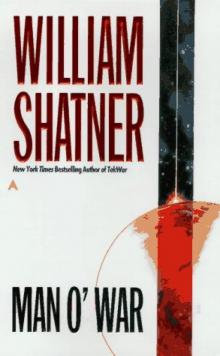 Man O' War
Man O' War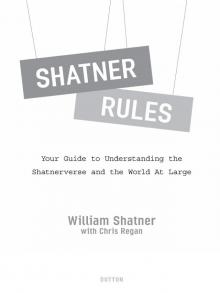 Shatner Rules
Shatner Rules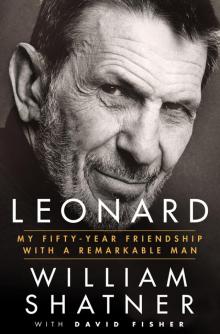 Leonard
Leonard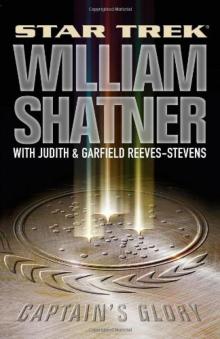 Captain's Glory
Captain's Glory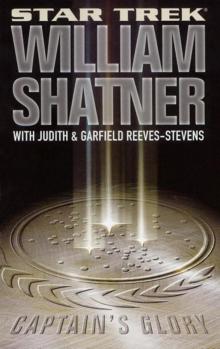 Captain's Glory зпвш-9
Captain's Glory зпвш-9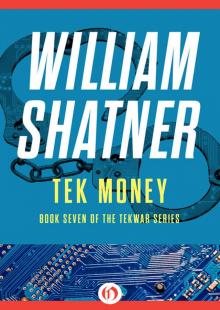 Tek Money
Tek Money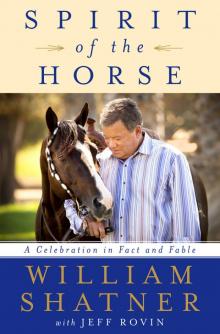 Spirit of the Horse
Spirit of the Horse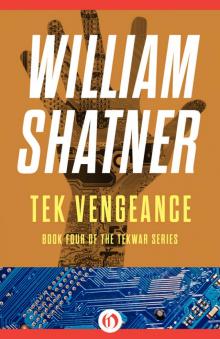 Tek Vengeance
Tek Vengeance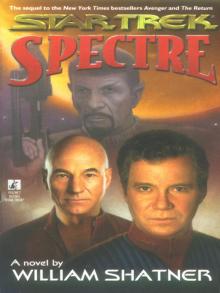 Spectre
Spectre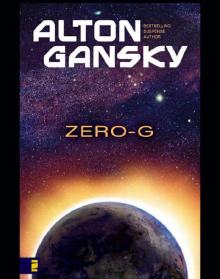 Zero-G
Zero-G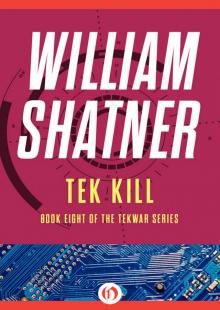 Tek Kill
Tek Kill Collision Course
Collision Course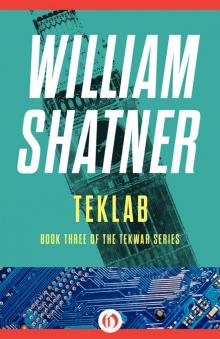 TekLab
TekLab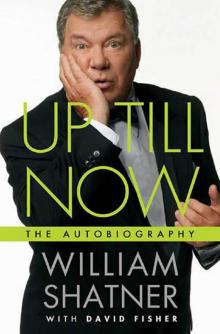 Up Till Now
Up Till Now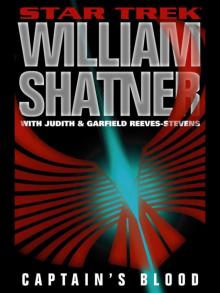 Captain's Blood
Captain's Blood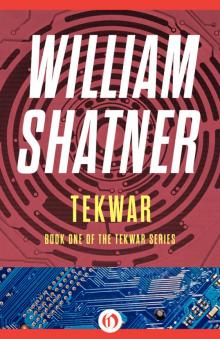 TekWar
TekWar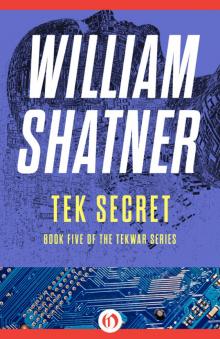 Tek Secret
Tek Secret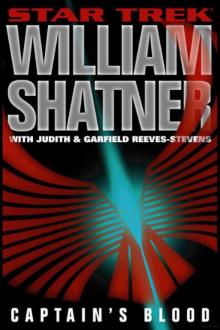 Captain's Blood зпвш-8
Captain's Blood зпвш-8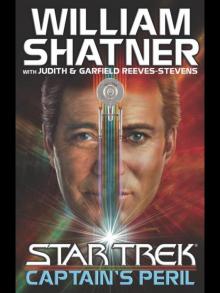 Captain's Peril
Captain's Peril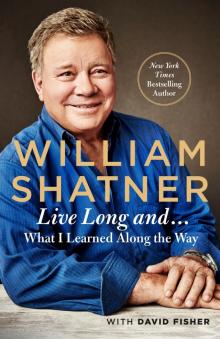 Live Long and . . .
Live Long and . . .